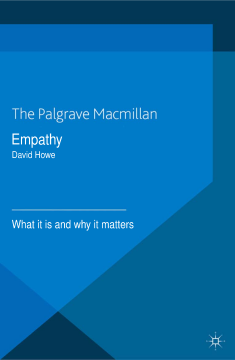
Additional Information
Book Details
Abstract
Empathy is profoundly important for understanding people's feelings and behaviour. It is not only an essential skill in conducting successful personal and working relationships, it also helps us understand what makes people moral and societies decent.
With this compelling book, David Howe invites the reader on an illuminating journey of discovery into how empathy was first conceptualised and how its influence has steadily risen and spread. He captures the growing significance of empathy to many fields, from evolutionary psychology and brain science to moral philosophy and mental health. In doing so, he eloquently explains its importance to child development, intimate relationships, therapy, the creative arts, neurology and ethics.
Written with light touch, this is an authoritative and insightful guide to empathy, its importance, why we have it and how it develops. It offers an invaluable introduction for readers everywhere, including those studying or working in psychology, counselling, psychotherapy, social work, health, nursing and education.
DAVID HOWE OBE is currently an Emeritus Professor in the School of Social Work and Psychology at UEA. His research and writing interests span social work theory, adoption, emotional intelligence, attachment theory, and child abuse and neglect. To date, he has written 17 books, many of them regarded as best-sellers.
A fascinating, well-written and wide-ranging exploration of the concept of empathy' - Professor Ernesto Spinelli, author of Practising Existential Psychotherapy
'Throughout this highly accessible book, David Howe communicates complex subjects with magisterial clarity and ease.' - Bernard R Moss, Emeritus Professor of Social Work Education and Spirituality, Staffordshire University
Table of Contents
| Section Title | Page | Action | Price |
|---|---|---|---|
| Cover | Cover | ||
| Half-Title | i | ||
| Title | iii | ||
| Copyright | iv | ||
| Contents | v | ||
| Acknowledgements | vi | ||
| 1 Introducing Empathy | 1 | ||
| 2 Origins and Definitions | 6 | ||
| 3 The Evolution of the Empathic Mind | 20 | ||
| 4 How Children Develop Empathy | 31 | ||
| 5 The Empathic Brain | 46 | ||
| 6 Individual Differences in Empathy Levels | 63 | ||
| 7 When Empathy Is Absent or Low | 74 | ||
| 8 Psychopathy and Borderline Personality Disorder | 88 | ||
| 9 Social Perspectives and Client Experiences | 101 | ||
| 10 Empathic Communication and Helping Relationships | 116 | ||
| 11 Why Empathy Works | 136 | ||
| 12 Empathy, Morals and Pro-social Behaviour | 147 | ||
| 13 Promoting Empathy in Children | 161 | ||
| 14 Promoting Empathy in Adults | 172 | ||
| 15 Living Well Together: Empathy and Social Cohesion | 186 | ||
| 16 Human Being | 198 | ||
| Bibliography | 205 | ||
| Subject Index | 229 | ||
| Author Index | 235 |
